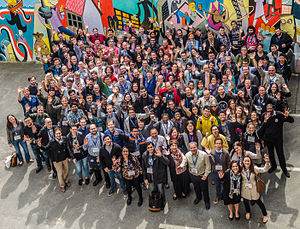Learning patterns/Planning effective conference sessions

What problem does this solve?
editConferences and meetups provide opportunities for Wikimedians to meet face-to-face. They can be a valuable way to share experiences, resolve on-wiki conflicts, build skills, plan future activities, and create goodwill among community members. However, conferences and meetups require extensive time, energy, and resources from volunteers, staff, and donor funds. Sessions are often planned without much thought to the goals, outcomes, audience preparation, or follow-up to make them as effective as possible.
What is the solution?
editGood program planning
editOn-wiki discussion with your community is essential to planning a good program. Individual sessions should be built-out and publicized at least six weeks in advance of the meeting. The goal for each session is to have:
- One or more specific topics/questions that are reasonable to cover in the allotted time.
- One or more specific outcomes in terms of what attendees of the session do at, or gain from, the session (e.g. brainstorm solutions to a problem; learn a skill; share best practices).
- A clear format – is it a lecture? a group discussion? a training workshop?
- Clear roles, i.e. who is/are the speaker[s]? Who runs or moderates the discussion, if any, and/or question-and-answer segment, if one is included?
- A clearly targeted audience, e.g. "this session would be useful to people who already have some experience running an education program", "this session will teach you the basics of using CentralNotice and GeoNotice", "this session is for people who don't know anything about GLAM", etc.
- Clear mention of any preparatory work attendees should do before the event, to maximize the utility of a rare (and expensive) face-to-face opportunity a conference would provide. For example, "before you arrive, please read the introductory material at [LINK]" or "Please think about your own group's experience and come prepared to share two successes and one mistake".
Active participants
editIt is crucial to have editors above a certain minimal level of experience in the room to allow for truly productive conversations. The presence of any number of newbies (or more than a tiny minority) greatly increases the odds that a session will turn into largely a largely introductory meeting rather than productive peer-learning, brainstorming, and planning sessions. That is why some kind of vetting of the participants is beneficial, and is especially critical when you are offering scholarships. This does not mean edit count is most important – there are, of course, other considerations. What really matters is that people have a minimum level of experience. Since the most effective programmatic work happens when there's a strong partnership between off- and on-wiki work, having the top editors participate ensures that a (mostly) off-wiki group in each country is (i) aware of, and (ii) on good terms with, the most active on-wiki contributors in the community.
Follow-up plans
editEach session should be well documented with documentation posted on-wiki after the meeting. All sessions should have action items and designated people (more than one) who will follow up within a set timeframe. Make sure you assign someone on the organizing team who can check on follow-up.
When to use
editAny time you're planning a meeting or conference.
Examples
edit- Organising a wikicamp for winners in an international wiki-contest. Editing and uploading activities were tailored to suit the main purpose of the event, which was to foster intercultural relations, bring new contacts and ideas, but also to write and upload content about the host country. Light articles were recommended to be written about the places visited, having first aroused the interest by guided tours.[1]
- The Ally Skills workshop held at Wikimania 2015 - a pilot program training admins on how sexism impacts Wikimedia projects - emphasized small group discussion with specific examples relevant to the community. Participants were given a clear, short introduction to topics and written materials to aid in working on examples in the small groups.[2]
Endorsements
edit- Tony (talk) 02:42, 28 June 2015 (UTC)
- This is a great learning pattern. I hope that people will add examples of how they have planned effective conferences. KHarold (WMF) (talk) 21:41, 16 September 2015 (UTC)
- This learning pattern covers good ground on the conceptual clarification of conferences, which is an important basis for such events. B. Jankuloski (talk) 15:27, 18 September 2015 (UTC)
- This learning pattern helped us a lot with the organization of Wikipedia Weekend. [3]--Margott (talk) 08:38, 23 December 2015 (UTC)